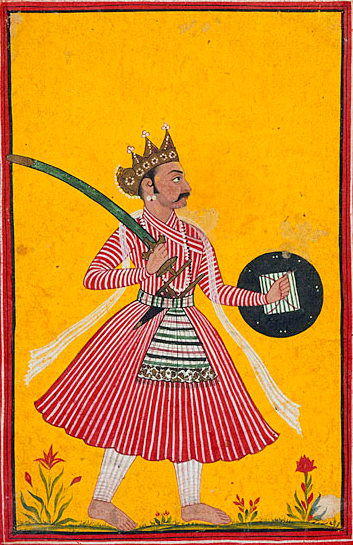 |
| Mahabhalipuram, Tamil Nadu (India) |
The twelve years of exile in the forest for the Pandavas were very hard and tiring. They no longer had the command of a flourishing kingdom, no longer lived in sumptuous palaces with servants and maids, but they lived in huts made of bushes and were exposed to the harsh climate and the dangers of the forest.
To make their exile less hard and to enable the five heroic brothers and their wife Draupadi to always have food, the Mahabharata tells us that Surya, the sun God, had given them a copper tray prodigious.
Every time that the Pandavas were hungry, the tray was filled with food and remained full of food until Draupadi had eaten. After the tray remained empty until the next day.
This magic tray made possible not only to the Pandavas to eat, but also to welcome the guests and the wise men who came to visit them with worthy honors. If the hospitality was not worthy and generous, the sages could cast a curse against the Pandavas, and in their situation, they could not afford to be cursed by some ascetic.
One of the most angry rishi was Durvasa. He always pretended to be received with full honors, demanded food for himself and for his many disciples who followed him always, if he had not been satisfied by his guests, he hurled painful curses.
One day, Durvasa went to the palace of Hastinapura where Duryodhana, the evil son of Dritharshtra who had exiled by fraud Pandava cousins, received him with the greatest honors. Durvasa was pleased and said to Duryodhana: "Ask what you want, I will give it."
The evil Duryodhana, who feared the return of the cousins at the end of exile, asked the rishi:
"Oh great and venerable sage, please go to the forest to visit my poor cousins, I are sorry for them and I’m sure they would be happy of your visit."
Duryodhana invited the rishi to go to Pandavas in the evening, after dinner, because he knew that in that way the magic tray would have been hopelessly empty until the next morning.
And so it happened. Durvasa went to the Pandavas and said: "I and my followers are going to do the ritual ablutions, we would like to eat when we come back."
Draupadi was desperate, the tray was empty and she was not able to prepare food in a short time for such a large group. She was terrified, the rishi would hurl a curse against the Pandavas once he was realized that there was nothing to eat. The Queen turned to Lord Krishna, she thought him with all his strength and Krishna appeared to her.
"Hello my Queen Draupadi," said Krishna.
"I need your help, my dear Lord!" Draupadi cried in anguish.
"Wait, I'm hungry, can you give me something to eat first."
"But it is precisely the problem, I’ve nothing to eat," said Draupadi.
"Are you sure? - Krishna insisted - Get the tray and look closely."
Draupadi took the tray and looked into it, it was empty.
"Look closer," said Krishna.
"There is nothing - Draupadi said sadly - there was only a grain of rice and a piece of vegetable."
"Give those to me," said Krishna.
Draupadi gave those to him and Krishna ate two small pieces of food.
"I am satiated - said Krishna to Draupadi - have no concern." And he went.
At the same time, Durvasa and his disciples were returning to the hermitage of the Pandavas and felt incredibly full, satiated, they were no longer hungry, they felt as if they had eaten a large meal.
"Excuse us, Queen - Durvasa said to Draupadi - thank you for your hospitality, but we’ll eat with you another day."
Thus Draupadi and the Pandavas were saved from the curse of Durvasa.
One who feed Krishna feeds the world.










